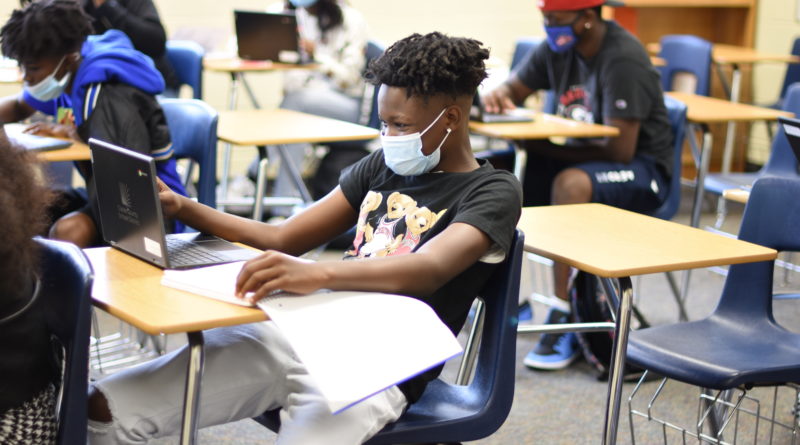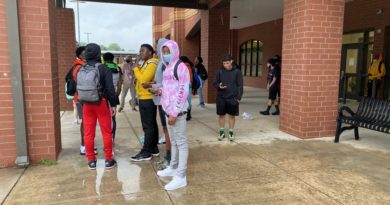CCSD, Cedar begin in-person school with masks required
This is a revised version of a story originally published in the Flagpole by Violet Calkin. In addition to Co-Editor-in-Chief of BluePrints, Calkin is also an intern writing for the Flagpole for the 21-22 school year.
As always, back-to-school season means notebooks flying off Target shelves, navigating new hallways and brushing the cobwebs off backpacks. After a year of virtual learning fraught with unparalleled challenges, Cedar Shoals and Clarke County School District students and staff made the much-anticipated return to in-person instruction on Aug. 4.
CCSD administration changed its mask policy multiple times over the summer, but under the current rules, masks are required for all students, staff and visitors for all grades, regardless of vaccination status. In addition to rising COVID-19 cases in Clarke County and lagging youth vaccination rates, Superintendent Xernona Thomas cited three positive tests among staff last week in her July 26 announcement to CCSD.
“Safety is our top priority, and we are determined to keep all schools open for in-person instruction. Requiring masks for everyone exponentially increases our ability to safely remain open for in-person learning, which is a top priority for the 2021-22 school year,” the letter reads.
Cedar history teacher Sarah Devon Milford is grateful for the newest guidance, despite the confusion policy shifts cause.
“It’s been incredibly frustrating to see guidance change and policy change and then change again and change again, but I think that is the appropriate thing to do, to wait for the latest guidance and update your policies,” Milford said. “I definitely appreciate the steps that the school and the district have taken to try and make sure that we’re as safe as we can be.”
Prior to a mask requirement for staff, vaccinated teachers had a nuanced decision to make. A K-8 teacher and CCSD parent who requested anonymity to protect their job says they grappled with whether to wear a mask in solidarity with their students or go maskless for the benefit of their instructional ability — important communication through facial expressions, voice projection and emotional connection is hindered by masks, they say. The mandate eliminated stress and made the choice clear.
“Students aren’t vaccinated, and they need to be wearing masks. As much as I don’t want to, I know that I need to, and the choice being made for me so that I don’t have a choice makes it easier,” the teacher says. “I don’t have to worry about whether I will, or my coworkers will, or my kids’ teachers will.”
The staff mandate also allows mask wearing to be demonstrated, the teacher says, which is essential in encouraging student mask compliance. “I can’t expect the kids in my class to wear a mask if I’m not wearing one,” they say. “That modeling is very important and that would be difficult if a teacher, or any staff member, wasn’t wearing one and was asking the kids to.”
Additionally, a mask mandate avoids potential animosity between teachers and parents.
“If you’re very worried about your child and you really think masks are important and then your child’s teacher is not wearing one that can cause a lot of anxiety, but also distrust and relationship problems between the parent and teacher,” the teacher says.

Cedar Shoals senior La’Kayla Massey questions whether other high school students will consider COVID-19 a risk or be willing to wear masks this school year. “I just don’t think people are worried about a mask, especially when Athens has lifted restrictions. You can go in the mall without a mask, you can go just about anywhere without wearing a mask. You’re not going to think ‘Oh, let me put on my mask when I go into the school building,’” she says.
In addition, Massey wants decisions made for the coming school year to accommodate circumstances that may be left in the shadows. “I hope they think about the kids that don’t have insurance to go to the doctor to get stuff done,” she says. “I hope that they bring more than one nurse into schools full of so many kids. I hope for our special needs kids, they’re giving them everything they need to make sure they can stay in the school building.”
Barnett Shoals Elementary fourth grader Sylvia Smith also has considered that some students may not comply. She has a plan if a classmate takes off their mask: “I’ll tell them to put their mask on, because it’s not safe for them to have their mask off because they might get sick and have COVID.”
Concern over back-to-school safety is amplified by the alarming statistics recently reported: the seven-day average of COVID-19 cases rose from less than two new cases a day in Clarke County a month ago to 40 as of Aug. 5, with merely one in every five eligible children and 39% of ACC’s total population fully vaccinated. The Centers for Disease Control and Prevention and other health officials urge caution, but efforts to transition back into normalcy with in-person instruction pose unignorable benefits for students and their communities.
“I don’t think we’re going to be done with COVID anytime soon,” says Sylvia’s mother, Natalie Smith. “I don’t think it’s going to be like, we all got vaccinated now COVID is gone. But we do have to move on with our lives. This year is going to be a step toward how we move on with our lives, being the safest we can, but also still moving forward.”




